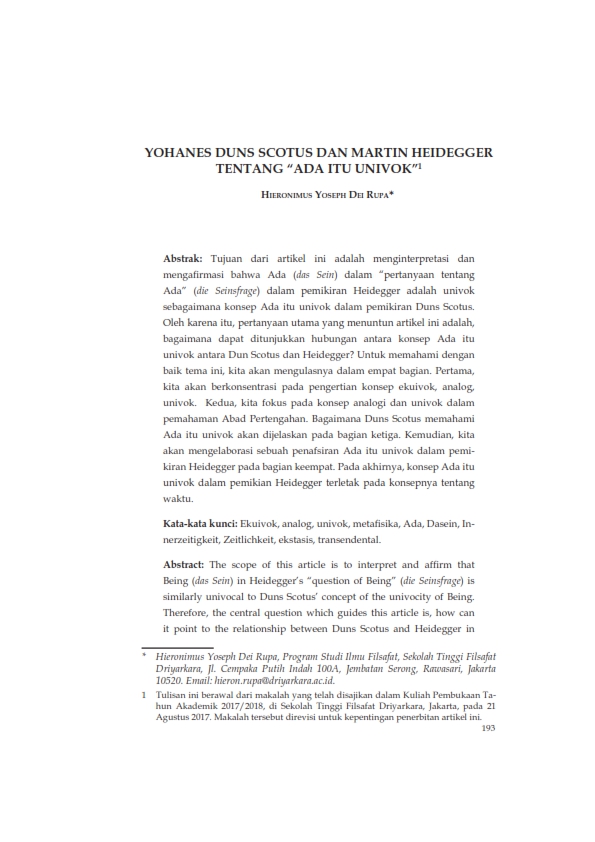Yohanes Duns Scotus dan Martin Heidegger Tentang “Ada Itu Univok”
Abstract
Abstrak: Tujuan dari artikel ini adalah menginterpretasi dan mengafirmasi bahwa Ada (das Sein) dalam “pertanyaan tentang Ada” (die Seinsfrage) dalam pemikiran Heidegger adalah univok sebagaimana konsep Ada itu univok dalam pemikiran Duns Scotus. Oleh karena itu, pertanyaan utama yang menuntun artikel ini adalah, bagaimana dapat ditunjukkan hubungan antara konsep Ada itu univok antara Dun Scotus dan Heidegger? Untuk memahami dengan baik tema ini, kita akan mengulasnya dalam empat bagian. Pertama, kita akan berkonsentrasi pada pengertian konsep ekuivok, analog, univok. Kedua, kita fokus pada konsep analogi dan univok dalam pemahaman Abad Pertengahan. Bagaimana Duns Scotus memahami Ada itu univok akan dijelaskan pada bagian ketiga. Kemudian, kita akan mengelaborasi sebuah penafsiran Ada itu univok dalam pemi- kiran Heidegger pada bagian keempat. Pada akhirnya, konsep Ada itu univok dalam pemikian Heidegger terletak pada konsepnya tentang waktu.
Kata-kata kunci: Ekuivok, analog, univok, metafisika, Ada, Dasein, In- nerzeitigkeit, Zeitlichkeit, ekstasis, transendental.
Abstract: The scope of this article is to interpret and affirm that Being (das Sein) in Heidegger’s “question of Being” (die Seinsfrage) is similarly univocal to Duns Scotus’ concept of the univocity of Being. Therefore, the central question which guides this article is, how can it point to the relationship between Duns Scotus and Heidegger in regards to the concept of the univocity of Being? To understand well this theme, we will explain it in four parts. First, we concentrate on the definitions of equivocity, analogy and univocity. Second, we focus on the concepts of analogy and univocity in the Middle Ages. How Duns Scotus understands the univocity of Being will be pointed out in third part. After that, we will elaborate an interpretation of the univocity of Being in Heidegger’s thought in fourth part. In the end, concept of the univocity of Being in Heidegger’s thought is put in his concept of time.
Keywords: Equivocity, analogy and univocity, metaphysics, Being, Dasein, Innerzeitigkeit, Zeitlichkeit, ecstatic, transcendence.

DISKURSUS applies the Creative Commons license (CC BY). We allow readers to read, download, copy, distribute, print, search, or link to the full texts of its articles and allow readers to use them for any other lawful purpose. Full information about CC BY can be found here: https://creativecommons.org/licenses/by/4.0/












